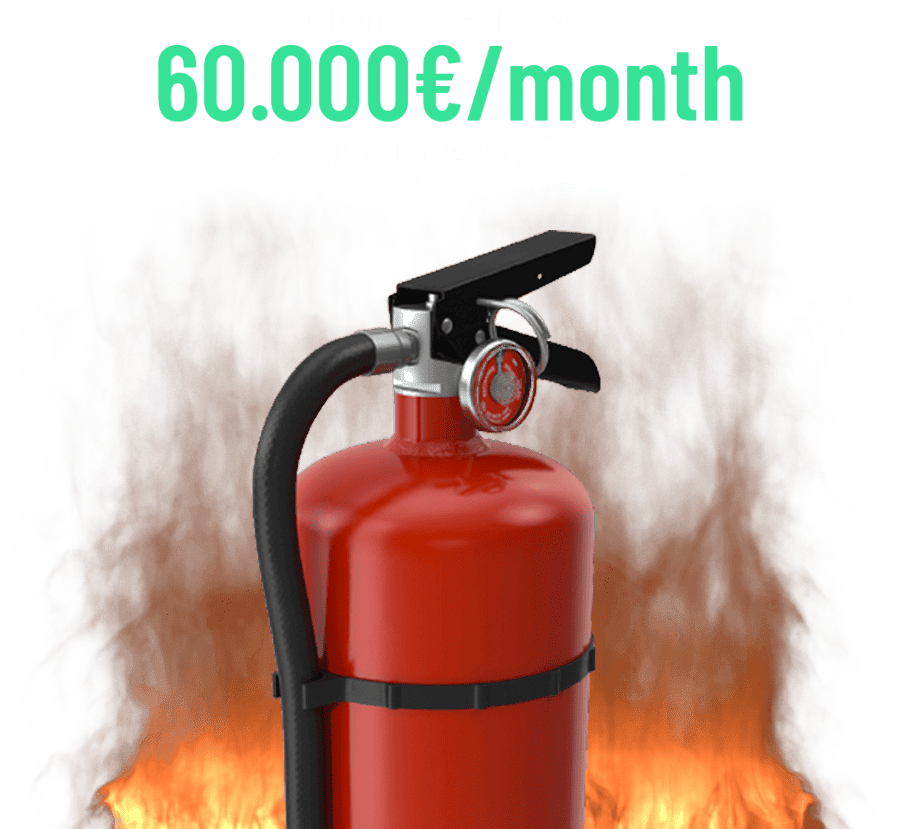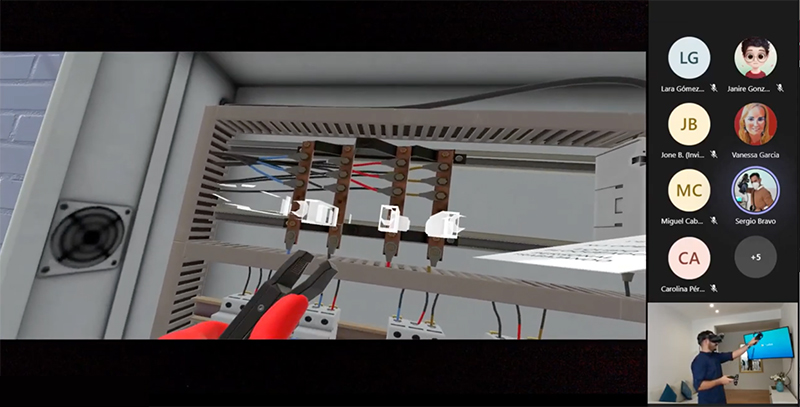How external prevention services can increase
their earnings with VR by Ludus
Ludus virtual reality (VR) simulations offer multiple advantages to external prevention services, including the possibility of earning more money. In this guide, you will learn how to make money by digitising your training with Ludus

Increasing the profit margin of prevention services comes mainly from savings. Virtual reality training is cheaper than traditional training, as it saves on equipment rental costs, facilities, etc.
An example of this would be fire safety training. In real life, every time a fire extinguisher is used, even if it is not completely emptied, it must be recharged afterwards. With the fire safety simulation, it is not necessary to rent different fire extinguishers to train trainees except in cases of mandatory practice.
Companies also save on recharging fire extinguishers thanks to Ludus. If an average of 1,200 fire extinguishers are emptied every month, with the simulation (figure for 2022), the total savings are more than €60,000.
Even in cases of compulsory training, training with VR will reduce the time spent on renting equipment or facilities. Having been trained in an immersive way beforehand, trainees will complete the training in less time and more efficiently.
As the training is cheaper and easier to organise, external prevention are able to deliver more courses. By being able to deliver more training with fewer resources, the cost of each training course is reduced. This also has an impact on the profit margin.

The Ludus platform allows external prevention services to offer their clients added value at an affordable price.
It should be noted that, without using prevention services that use Ludus or without our leasing model, using VR in training would be more expensive for the client companies. The cost of buying at least one piece of virtual reality equipment to use for simulations would amount to several thousand Euros. Therefore, if a external prevention services decides to offer Ludus VR as a more complete version of its training, the extra cost will be affordable for the client.
By being able to access the technology at an affordable price instead of having to spend a considerable amount of money, more companies will be able to afford this added value in their training.
However, third-party prevention services have other ways of up-selling due to being able to offer features beyond standard training:

- Offer regional or global VR training to train more people in less time.

- Hour flexibility: VR grants a flexible hour load, allowing for example to increase the number of hours per session so that all employees go through the simulation and learning process.

- More refresher training: Instead of selling a single training course, they can also sell packages of X refresher training sessions per year that expire.
In terms of cross-selling, preventive services can offer various add-ons depending on the interests of their clients:
- New functions such as "Virtual drills". Prevention services put workers in dangerous situations that they have to handle correctly.
- Training based on other simulations:A customer looking for CPR training may be interested in other training such as fire extinguisher handling. Even several simulations can be used in one course: Electrical Hazards, LOTO and Fire Safety can be used in the same training, for example.
- The company's usage and performance data from its customers. This provides a visual report of useful data such as hours of use, and exercises passed or failed... It helps companies and prevention services to make informed decisions.
- Sell the simulation as a test when hiring new staff. The new employee goes through the simulation to see if they are familiar with the safety procedures or to brush up on them. Also to make sure that external subcontractors comply with safety procedures.
New trainings: Even prevention services specialised in a specific type of training (for example, only training on lifting platforms) will find it easier to provide other trainings thanks to the tool, thus, increasing their offer.
Prevention services will sell more refresher training: Training such as CPR and handling of fire extinguishers have to be repeated periodically so as to refresh the employees´ training.
With Ludus VR, these refresher trainings are carried out efficiently and one at a time. In this way, the employees keep refreshing their knowledge, and the workplace does not come to a standstill. The external prevention service can include these refresher trainings in the price of its offer to the customer.
In some cases, it is not possible for external prevention services to offer training due to a lack of resources. The need to travel, the urgency of the client's needs, the lack of time to prepare the training or rent the facilities, all these inconveniences can mean that the SPA cannot meet demand and therefore loses out on making money.
An example of how Ludus helps with this would be CPR training. With the simulation, which explains the entire procedure step-by-step and provides a real-time assessment of the compressions, a trainer is able to deliver the training more easily. In this case, it is not necessary for an expert healthcare provider to conduct the training. It can also be organised easily and/or at short notice.
With the webinar/online format of the Ludus simulations, you can optimise resources and conduct training remotely without having to travel. This allows you to respond to urgent customer needs and increase flexibility and product availability.
By being able to respond quickly and organise training courses easily or remotely, they do not have to refuse orders due to a lack of resources. Here, rather than earning money, the benefit for preventive services is to not stop earning it.
The webinar or remote format also makes external prevention services more attractive for large companies or multinationals. Thanks to Ludus technology, trainers can deliver standardised and uniform training to employees in different locations.
By not having to move to different headquarters or countries, the savings related to relocating people or equipment is considerable. The external prevention services client company also benefits from not having to hire several prevention services to provide training at its different sites.
With Ludus remote training, the prevention expert puts on the headset and performs a simulation, sharing image and sound. This way, employees can follow the training remotely on a screen and participate by answering questions or guiding the trainer.
- Employees at all locations receive the same training, based on the same legal standards and content, and delivered by the same external prevention services.
- The data collected by the tool makes comparing results between different sites possible. Even if the trainer wears the headset, if he/she lets the employees guide him/her, it is the employees who make decisions and mistakes. This allows informed decisions to be made regarding the training.

The use of virtual reality is one of the first innovations to be introduced in the prevention sector in decades. Incorporating it into your training offer is a great differentiating value for an external prevention service.
In this case, the advantage that Ludus gives them is competitive. By offering an innovation that other prevention services do not offer, they compete on value, avoiding price competition. The economic benefit will come from selling more training courses than the competition because of this competitive advantage.
Another element of differentiation would be the reduction in the environmental impact. By not having to travel, light fires, use and recharge fire extinguishers, and reducing the time spent practising with machinery, Ludus VR helps to reduce the environmental footprint.
The incorporation of this technology positions the company as an environmentally conscious entity based on tangible arguments, which is another differentiating element with respect to the competition, in order to sell more and make more profit.
